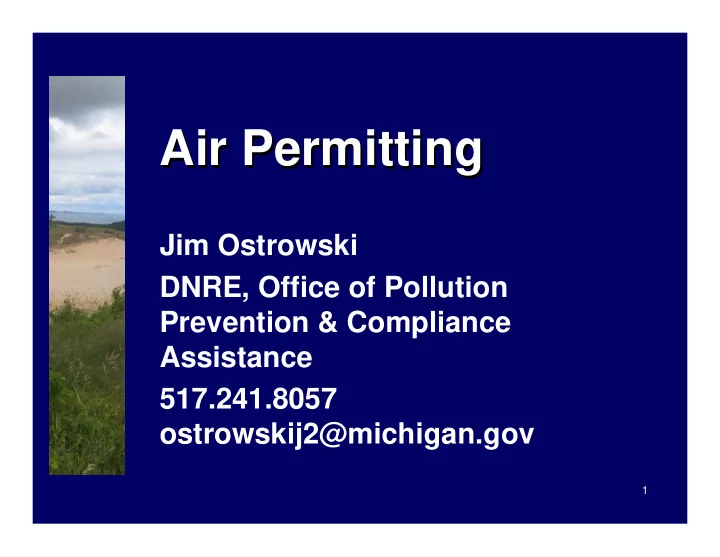

Air Permitting Air Permitting Jim Ostrowski DNRE, Office of Pollution Prevention & Compliance Assistance 517.241.8057 ostrowskij2@michigan.gov 1
Goal Provide you with a basic understanding of the air permitting requirements. � Types of air permits � Who needs one � How to apply for one � How to stay in compliance 2
3 Handouts
Air Quality Compliance Air Quality Compliance � Who Regulates Air Quality � How is Air Quality Regulated � Air Permitting 4
Who Regulates Air Quality? Who Regulates Air Quality? � U.S. EPA � DNRE, Air Quality Division � Local Government 5
How is Air Quality Regulated? How is Air Quality Regulated? Clean Air Act Clean Air Act Part 55, of the Natural Resources Part 55, of the Natural Resources and Environmental Protection Act and Environmental Protection Act Michigan Air Pollution Control Michigan Air Pollution Control Rules Rules 6
Source Information State Regs Source Air Air parameters Federal Permit Permit Regs Emission Reporting Operation Limits Restrictions Emission Limits Monitoring/ Material Limits Records 7
8 � Renewable Operating Permit Types of Air Permits Types of Air Permits � Permit to Install
Permit to Install Permit to Install � A.K.A New Source Review Permit � Applicable to any business regardless of size � Pre-Construction Pre- Permit construction Permit 9
R 336.1201 R 336.1201 10 Rule 201 Rule 201
When is a Permit to Install When is a Permit to Install Required? Required? � Air permit is required if process or activity emits and air contaminant. � Unless, process or activity is specifically exempted in rules. 11
12 Do I Need an Air Permit? Do I Need an Air Permit?
Common Air Emission Sources � Boilers � Standby Generators � Degreasers � Bulb crushers � Paint Operations 13
Boilers – Permits � Exemption = R 336.1282(b) � Permit to Install Required if: � Nat gas > 50 million Btu/hr � Fuel Oil >20 million Btu/hr � General Permit for 100 million Btu/Hr Boilers 14
Standby Generators - Permits � Exemption = R 336.1285(g) � Permit Required if: � Generator > 10 Million Btu/hr � Emissions are “Significant” � General Permit to Install for Generators 15
Degreasers/Cold Cleaners Degreasers/Cold Cleaners � Exemption = R 336.281(h) � Exempt if air/vapor interface not more than than 10 ft 2 16
17 (Permit to Install) prior Needs an approved Bulb Crushers state air permit to installation.
Painting Operations � Exemption = R 336.1287(c) � Air Permit Required if use > 200 gal coating/month � Must keep records 18
The Air Permit Application � Free www.deq.state.mi.us/aps/#PTI � Basic Source Information � Stack info � Process and site information � Emission estimates 19
20
The Air Permit � Contains requirements source is subject to � Contract between state of MI and business 21
Renewable Operating Permit (ROP) � A.K.A Title V Permit � Title V of Clean Air Act � Required if Facility is a “Major Source” � Combines requirements from issued PTIs r o j a M s e c r u o S y l n O 22
Major Source � Potential to Emit � > 100 tons/yr Criteria Air Pollutant � > 10 tons/yr single Hazardous Air Pollutant � >25 tons/yr total Hazardous Air Pollutants 23
Potential to Emit � Maximum amount of air contaminants that your source could emit if: � Operate at 100% of design capacity; � Operated 24hrs/day, 365 days/yr � Worse-case materials used or processed 100% of the time � No air pollution control equipment 24
25 Emissions Potential Potential to Emit Emissions Actual
ROP Requirements � Apply within 12 months of becoming a major source � Renew Every 5 years � Annual Air Quality Fee � Annual Air Emissions Reporting � Annual and Semi-Annual Compliance Reporting � Deviation Reporting 26
10 Tips 10 Tips for Staying in Compliance with for Staying in Compliance with Air Quality Regulations Air Quality Regulations 27
28 1. Conduct a Facility Conduct a Facility Inventory Inventory 1.
29
Sources of Air Emissions boiler PTI #999-02 exempt! Keep in your records! Keep in your records! welding station Rule 285(i) Paint Booth 1 & 2 PTI #999-95 exempt! Paint Booth #3 Rule 287(c) Cold cleaner exempt! Rule 281(h) 30
2. Know Your Permit and Know Your Permit and 2. Understand Requirements. Understand Requirements. 31
3. Establish Procedures Establish Procedures 3. � Monitoring procedures � Recordkeeping practices � Reporting schedules � Internal review process 32
4. Practice Good Record Practice Good Record 4. Keeping! Keeping! � Keep them organized � Develop a retention schedule per requirement 33
5. Know the Reporting 5. Know the Reporting Deadlines. Deadlines. (Don’ ’t miss reporting deadlines) t miss reporting deadlines) (Don Annual Report Due! 34
6. Don’ ’t Recreate Records or t Recreate Records or 6. Don falsify data. falsify data. I don’t have data for that day. Let’s just fill it in now. I’m not certifying that! We need to report it. 35
7. Take immediate action to 7. Take immediate action to correct violations. correct violations. Don’t wait until you get caught! 36
8. Do not ignore 8. Do not ignore correspondence from the correspondence from the DNRE. DNRE. Michigan Department of Natural Resources and Environment 37
9. Communicate with your 9. Communicate with your Inspector Inspector � Ask for a business card when they visit � Ask questions 38
10. Educate Yourself Educate Yourself 10. � Understand Terminology � Read DNRE Education materials � Attend DNRE Workshops � Keep up on Rules 39
40 Resources Resources
Web Resources Services � Find Permits www.deq.state.mi.us/aps/ � Site Registry www.deq.state.mi.us/SiteRegistry/ � Online Training www.michigan.gov/deqworkshops (click on “Online Training”) 41
Publications � Permit to Install – Determining Applicability Guidebook � Potential to Emit Workbook � Exemption Handbook 42
43 � Training is offered by our experts on a variety of environmental programs. Training
44 QUESTIONS?
Recommend
More recommend